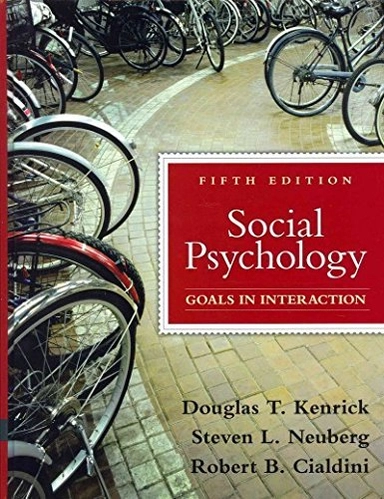Amazing deeds of heroism and horrific acts of terrorism. Undying love, friendships gone wrong, and inspirational leadership.Social Psychology: Goals in Interaction introduces the student to the fascinating mysteries of social behavior. By revealing the motives behind social behavior—whypeople love, hate, lead, and follow, for example—and bridging the person and the social situation, KNC actively engages the students' natural curiosity while providing the only textbook with a truly integrative, coherent approach. A unique integrated approach to social behavior: What do terrorist bombings, testosterone, one-minute “hurry dates,” Facebook, and political smear campaigns have to do with one another?Social Psychology textbooks typically provide a laundry list of interesting, but disconnected facts and theories. This standard approach grabs interest but falls short as a way to learn. Kenrick, Neuberg, and Cialdini instead provide an integrative approach, one that both builds upon traditional lessons learned by the field and pushes those lessons to the cutting-edge. By organizing each chapter around the two broad questions–“What are the goals that underlie the behavior in question?” and “What factors in the person and the situation connect to each goal?” –the book presents the discipline as a coherent framework for understanding human behavior. Expanding the integrative theme in this edition, KNC highlights social psychology as theultimate bridge discipline–connecting the different findings and theories of social psychology, exploring the field's links to other areas of psychology (e.g., clinical, organizational, and neuroscience), and bridging to other important academic disciplines (e.g., anthropology, biology, economics, medicine, and law). Opening mysteries: Each chapter begins with a mystery, designed not only to grab student interest, but also to organize the ensuing discussion of scientific research:Why did the beautiful and talented artist Frida Kahlo fall for the much older, and much less attractive, Diego Rivera, and then tolerate his numerous extramarital affairs? What psychological forces led the Dalai Lama, the most exalted personage in Tibet, to forge a lifelong friendship with a foreign vagabond openly scorned by Tibetan peasants? Why would a boy falsely confess to murdering his own mother? The authors are each well-known researchers who have contributed cutting edge findings to the field. The latest scholarship, engaging writing, engrossing real-world stories and the authors' strengths as renowned researchers and expert teachers, all come together to make the fifth edition of Social Psychology: Goals in Interaction an accessible and engaging read for students,¿while providing¿a modern and cohesive approach for their teachers. Looking for additional resources to help you understand the material and succeed in this course?MyPsychLab contains study tools such as flashcards, self tests, videos, as well as writing resources and a complete ebook. MyPsychLab is available atwww.mypsychlab.com.
Åtkomstkoder och digitalt tilläggsmaterial garanteras inte med begagnade böcker





















